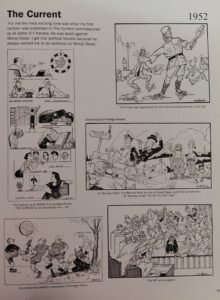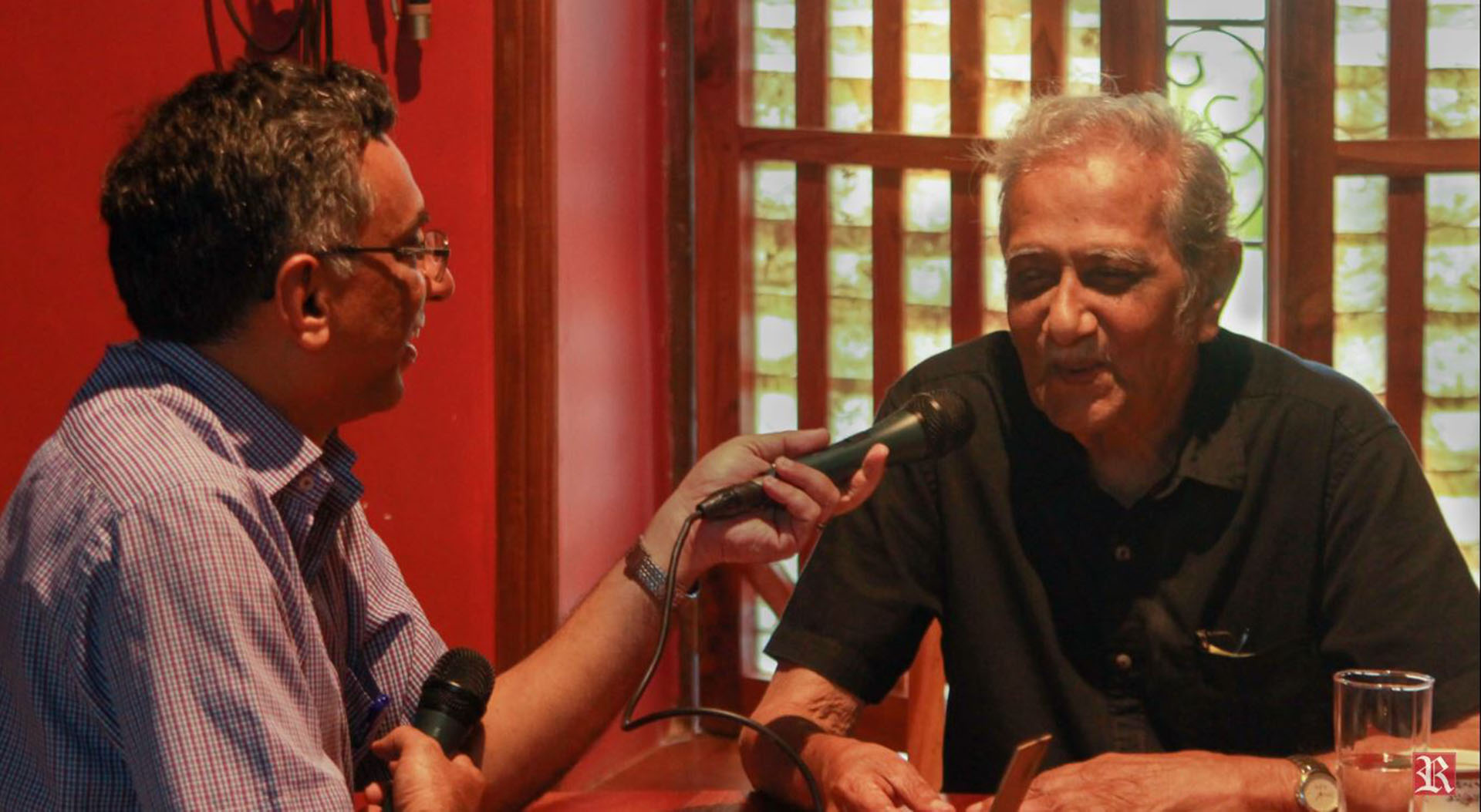Story of Mário, the Miranda (Part 2/6)
 The Artist as a Young Man
The Artist as a Young Man

It was during his college days in Bombay that Mário’s characters first strutted out of his diaries; he drew pocket cartoons and peddled them at Flora Fountain for pin money.[11] And at a medical ball held at Clube Vasco da Gama, Panjim, couples dancing the night away delighted in the frisky sketches of the faculty members that Mário kept drawing on the wall mirrors lining the ballroom.[12]
It is not that Mário always passed uncensured. One day, a priest from the village, whom he had depicted outside the local fish market, showed up at his house. Mário’s mother, after doing her best to placate the visitor, ended up going to see archbishop Dom José da Costa Nunes, who had once expressed his wish to meet the young artist. Mário was hesitant but once there, was relieved to see his diaries spark guffaws rather than a controversy. ‘That was the first time I was appreciated by someone I didn’t know,’ he said.[13]
Mário maintained a diary right through his years spent in British India with intermittent stays in Goa and Damão (Figure 2). The last three logbooks (1949-51),[14] now available in print, are a shrine of frolicky pictures of relatives and friends in Loutulim, Panjim and Margão.[15] To quote Nissim Ezekiel, ‘the buffoonery of his human figures is redeemed from grossness by their verve, their inner urge towards going places, getting somewhere. It is not always their fault that there is no place to go, nowhere to get except through the corridors of illusion.’[16]

That was Mário’s equivalent of the dark night of the soul! His lifestyle was a cause of concern to his by now widowed mother struggling to manage the household while at the same time providing for Pedro at Princeton University.[17] But then Mário had a change of heart: was it the showcasing of his watercolours and drawings by the 1950 Souvenir of the Bombay-based Loutulenses League[18] that did the trick?

In 1951, seeing a bleak future for himself in Goa, Mário moved to Bombay. Though creative possibilities seemed unlimited here, he was jobless and quite badly off at first. That’s precisely when Policarpo (Polly) Vaz, a fellow hosteller at Rockville,[19] famously suggested to him to hand-craft picture postcards depicting the city monuments, offering to sell them at the hotel where he worked the night shift. Needless to say, the two became fast friends; and they had even thought of migrating to Brazil,[20] when Mário got a call from D. F. Karaka of The Current. The redoubtable editor, riveted by Mário’s diaries, commissioned him to cover a can-can dance scene at the Taj Hotel, and received such a rib-tickler that he promptly took him on as the tabloid’s regular cartoonist.
The young Goan created a stir in Bombay's journalistic circles when his cartoons first appeared in the press. Editor C. R. Mandy and art director Walter Langhammer soon invited him to The Illustrated Weekly of India. Before long, other Times Group publications,[21] too, began to use Mário’s drawings; they skilfully portrayed movement and sound, and often featured the cartoonist’s trademark dog.
Art of Cartooning
That was the year 1952. Mário had virtually stumbled into the profession of cartooning.[22] To an onlooker the job seemed easy, and everything grist to the mill – from the bureaucracy, fashions, business, and people’s habits, to the animal world, environment, music, society, and even politics – but really, finding humour was no mean task. ‘There are times when you don’t feel funny, or may not feel like laughing, but still have to produce a funny cartoon – like a clown who has got to make people laugh all the time, although he doesn’t feel like laughing.’[23]
Elaborating on his predicament, Mário said, ‘People expect me to come up with jokes and anecdotes to make others laugh. I can’t do that. I enjoy humour if it comes from someone else who knows how to tell a good joke…. I am not a naturally funny person; I may look funny, but I am not funny.’[24] And if a cartoonist’s defining quality it is ‘to detect funniness in people’s behaviour or physical features and draw it, it is equally important to be able to laugh with someone, not at someone, without being cruel,’ said Mário, adding: ‘Humour is something very personal, individual. What’s funny to me may not be funny to you. Sometimes I do something which I think is very funny – and it flops! And people asking you to explain a cartoon flattens it completely.’[25]

Past the initial scramble for work, Mário began to yearn for the blissful spontaneity of his diary sketching. Add to this the fact that political bigwigs were breathing down his neck, and Mário had a sure recipe for disenchantment. Bombay Presidency’s Home Minister Morarji Desai was among the first ones to let his irritation show – something that taught Mário early on that lampooning political animals involved high risk. When he toned down the humour to appease the readers, cartooning quite paradoxically became a ‘serious business’. ‘Cartoonists are very serious people, and cartoons, no laughing matter,’[26] he quipped.
Finally, Mário stopped pursuing individual politicians; he began to see himself as a social caricaturist more than anything else. He is on record as saying, ‘I am not even a cartoonist; I draw… give me a pen and blank paper and I will draw. I just love to draw.’[27]
Acknowledgements: (1) I am indebted to Fátima Miranda Figueiredo for her knowledge and patience translated into many hours of whatsapp chats about her brother Mário and the family; and to Raul and Rishaad de Miranda for their warm welcome and lively conversation. (2) Banner picture: Portrait Atelier Goa (3) Article first published in Revista da Casa de Goa, Lisbon, Series II, No. 12, Sep-Oct 2021
[11] ‘Tale of Two Goans: Mario Miranda & Wendell Rodricks’, https://www.youtube.com/watch?v=5FDLGApfATc&t=5s
[12] Cf. Fernando de Noronha, Momentos do meu passado (Goa: Third Millennium, 2002), p. 146.
[13] FTF Mario Miranda, op. cit.
[14] Cf. The Life of Mário (1949, 1950, 1951) ed. Gerard da Cunha (Goa: Architecture Autonomous), in 2016, 2012 and 2011, respectively. Fátima Miranda Figueiredo reckons that her brother’s diary sketches total up to about 6,750 over a period of 18 years (1934-1951).
[15] He frequented the houses of his relatives, Judge António Miranda and Captain Adolfo Menezes, in Panjim, and Judge Eurico Santana da Silva, in Margão; and often stayed overnight with friends in their hostels.
[16] Nissim Ezekiel, ‘No escape if Mario is looking at you,’ in Mário de Miranda, ed. Gerard da Cunha (Goa: Architecture Autonomous, 2005), p. 276.
[17] As told by Fátima Miranda Figueiredo, 27.5.2021.
[18] Souvenir of the Silver Jubilee of the Loutulenses League (Goa: Imprensa Nacional do Estado da Índia, 1950). Curiously, in the chapter titled ‘The Rising Generation’, Mário figures as an Arts graduate, not as an Artist.
[19] Polly was from Bastorá; other hostelites, Joe Albuquerque and Paulo Miranda, from Loutulim. Cf. Mário de Miranda, op. cit., p. 14.
[20] Manohar Malgonkar, ‘Biography’, in Mário de Miranda, op. cit., p. 15.
[21] Femina; Filmfare; The Evening News and The Economic Times.
[22] Conversation with Shri Mario Miranda – 2 (Outtakes), op. cit.
[23] FTF Mario Miranda, op. cit.
[24] Ibid.
[25] Ibid.
[26] Ibid.
[27] Manohar Malgonkar, ‘Biography’, in Mário de Miranda, op. cit., p. 24; Conversation with Shri Mario Miranda – 2 (Outtakes), op. cit.
Story of Mário, the Miranda (Part 1/6)

Over the past century and a half, Goa has produced an array of artists.[1] Nearly all of them went to art school in Bombay, joined art movements, and flourished at home or abroad. While recognition of their contribution is long overdue, there is also the curious case of the self-trained artist Mário Carlos do Rosário Brito Miranda (1926-2011), or Mário de Miranda, whom the same fraternity has only grudgingly given credit. He worked in different styles, in different mediums, even across the media; and apparently no frame has been able to encompass his versatility. He was known simply as ‘Mário’, but he was equally Miranda, that is, ‘worthy of admiration’.
Early Life
Mário was born in Damão, to Constâncio do Rosário Miranda[2] and Maria Zulema de Brito.[3] Miranda was a civil administrator in the then Portuguese enclave where he got engaged to pretty Zulema, twenty years his junior. Her family hailed from Assonorá (in north Goa) and was prominent in that town on the Gujarat coast. They married in the groom’s native village, Loutulim (south Goa), in the year 1923, and had their first two children in Damão: Pedro in 1924, and Mário in 1926.

By 1929, the family was back to their splendid manor house that still flaunts a coat-of-arms.[4] Mário wore his heritage lightly but took delight in the old-world ambience marked by wit and humour, music and mirth.[5] He was as much attracted to reading as he was to the piano, sports and pets.[6] But sketching was undoubtedly his first love; so, if not playing records on the wind-up gramophone, he would be doodling Goan celebrities, village bumpkins and animals on the house walls, much to his grandmother’s annoyance. He once said, tongue in cheek: ‘In those days I visualised I would be another Michelangelo… but it didn’t work that way.’[7]

Little Genius
Mário’s mother quick to spot his talent gifted him blank diaries; he feverishly filled them out with bright, breezy colour sketches and a few jottings in Portuguese. They were virtually his confessions; but relatives and friends happily leafed through those pages, which unwittingly froze a microcosm of mid-twentieth-century Goa. In fact, Goan characters so populate his work that one can safely say, ‘Here is Goa’s plenty!’

On closer examination, Mário’s chronicles transcend Goa and mirror universal human nature. The little genius notices everything and everyone, and spares none. The serious and the pompous come very especially under his scanner. According to him, ‘when people take themselves too seriously, they tend to be funny.’[8] While his drawings embody that insightful observation, they don’t merely distort a person’s features; they perceptively bring to light things invisible to the naked eye.[9] Thus, more than just ‘Goa’s plenty’, we may say of Mário’s diaries what Dryden has said of Chaucer’s Canterbury Tales: ‘Here is God’s plenty!’
Mário, perhaps one of the world’s youngest visual diarists, was in his final year at St Joseph’s Boys’ High School, Bangalore, in 1942, when his last sibling, Fátima, was born in that garden city. And while his school buddies lapped up his naughty pencil strokes, his mother dreamt lofty dreams. In the following year, she enrolled him at the J. J. School of Art, Bombay, in preparation for the Beaux-Arts de Paris. But the teenager, feeling trapped rather than freed by formal art education, left the school in a day’s time and joined St Xavier’s College instead. He graduated in English Literature in 1949, and briefly considered joining the Indian Civil Services. Not surprisingly, he later said he was better off as a cartoonist than he would have been as a bureaucrat![10]
Acknowledgements: (1) I am indebted to Fátima Miranda Figueiredo for her knowledge and patience translated into many hours of whatsapp chats about her brother Mário and the family; and to Raul and Rishaad de Miranda for their warm welcome and lively conversation. (2) Banner picture: Portrait Atelier Goa (3) Article first published in Revista da Casa de Goa, Lisbon, Series II, No. 12, Sep-Oct 2021
---------------------------------------------------------------------------------------------------------------------------
[1] António Xavier da Trindade (1870-1935), António Piedade da Cruz (1895-1982), Ângelo da Fonseca (1902-1967), Raghuvir Chimulkar (1905-1958), Ângela Trindade (1909-1980), Vasudeo Gaitonde (1924-2011), Francis Newton Souza (1924-2002), Laxman Pai (1926-2021), Vamona Navelcar (1930-), and José Pereira (1931-2015), to name but a few.
2] Constâncio Teodósio do Rosário Miranda (1883-1946) was the son of João Baptista Miranda and Ermelinda Xavier Miranda.
3] Maria Zulema de Brito (1903-1988) was the daughter of Luís Diogo de Brito and Maria Francisca de Melo.
[4] Mário’s great-grandfather Constâncio do Rosário Miranda (Sr.) was granted the coat-of-arms with the title ‘Fidalgo da Casa Real’, for capturing dreaded bandit Custobá Rane, in 1871.
[5] Mário’s father and grandfather were witty gentlemen; his uncle Carlos, later a Supreme Court judge in Portugal, and brother Pedro were artists; and mother Zulema, a pianist. (Fátima Miranda Figueiredo, 23.5.2021)
[6] He was fond of classical literature and music, and played football, volleyball and badminton.
[7] FTF Mario Miranda, 26.4.2003 https://www.youtube.com/watch?v=AvUFUdp20MU
[8] Ibid.; Conversation with Shri Mario Miranda – 2 (Outtakes), https://www.youtube.com/watch?v=wBmMiEqvTy0
[9] FTF Mario Miranda, op. cit.
[10] Doordarshan National, Eminent Cartoonists of India, #04, https://www.youtube.com/watch?v=gkFpyDlQb88
Navelcar, aka Ganesh

On a rainy morning in June [2018], we went up to the village of Pomburpa, taluka of Bardez, on a visit to the well-known Goan painter, stained glass designer and ceramist Vamona Ananta Sinai Navelcar, whose pen name is Ganesh. Despite his grey hair, he was a picture of rare vitality, and in this chat he comes across as enchantingly feisty. He invited us to see the inner patio of his house which doubles as his atelier.
For the original chat show in Portuguese, see https://www.youtube.com/watch?v=rMgblHr5gk4&t=1s
ON: We are face to face with a canvas [Last Supper] that you are working on… I suppose it’s your most recent work...
VN: I started it a week ago and have to deliver it in the next two days...
ON: You work at top speed!
VN: It feels good to work. I have worked on many Last Suppers – more than 30, in Portugal and here…
ON: Do have a penchant for Last Suppers?
VN: Yes, for Christ! At 8 years of age, I used to read the Bible in Konkani. I was surprised to see what a fine figure Christ is! I became more of a Christian ever since, a disciple of Christ indeed. I think I have nothing of Hinduism, nothing, and I belong totally to Christ…
ON: So you have a relationship...
VN: Yes, yes, there is a mystic relationship between me and Christ.

ON: Will this canvas too be signed ‘Ganesh’?
VN: Always Ganesh. None of my paintings bear my name alone. It could bear my name but this is always followed by ‘Ganesh’.
ON: Why ‘Ganesh’?
VN: Ganesh was my elder brother, who died at 16 when I was 8 years old. He was my guide.
ON: Did he inspire you to paint?
VN: My father wouldn’t allow me. He wanted me to be a doctor – like Hindus always do. I used to paint on the reverse of the calendars and would hide them when he came.
ON: Do you still have those calendars?
VN: No longer. After so many years… Well, now they would have been worth a lot.
ON: Indeed. But what was your father’s grouse against painting?
VN: I think the Hindu community holds art in contempt.
ON: Well, the Hindu civilization has great works of art to their credit… Ajanta and Ellora, for example, and so many other places.… Why the contempt, then?
VN: They are materialistic... What money does art fetch you? Medicine does!
ON: If not an artist, what would you have been?
VN: If not an artist today, I would have continued to be an employee of Chowgule’s…. After Matriculation, I began working there; I came across many people, until one day came the inauguration of the Chowgule Mines. Chowgule asked me to draw two portraits: one of him and other of the Governor. I did so. At the inaugural ceremony, the Governor asked the painter’s name; Mr Chowgule said it was one of his employees. I was called. The Governor was Bénard Guedes… the first thing he asked me was if I would like to study Art. If so, I could go to Portugal, but I said I would prefer Sri Lanka or Karachi… He said I should go to Portugal, and I said no. He then gave me a month’s time to decide, and thus I felt compelled to leave for Portugal. I couldn’t speak Portuguese very well then.

Stay in Portugal
ON: Did you complete your Lyceum in Portugal?
VN: There I did the 5th to the 7th Years of Lyceum; I did it in two years.
ON: After the Lyceum, did you move on to the School of Fine Arts? And how long was the course?
VN: It was a five year course. First it was the general course, then the complementary course. And for the admission test, one day as I was practising drawing, the teacher commented: ‘My friend, your drawings are poor. It won’t be a good idea to answer the admission test this year.’ After a week or so, he had a different opinion. My colleagues too were surprised to see a big leap forward from my first drawing. I stood second in the admission test.
ON: How was the Fine Arts course?
VN: Good. But those teachers knew nothing about other arts, the Oriental arts, Chinese and Japanese; and that India is another world, with a different culture. There was, however, a brilliant teacher, architect Frederico Jorge, who said ‘You have an original palette, and bright colours! You have a style of your own. Follow your path.’ Then came the Invasion or Liberation of Goa, or whatever you call it. I was stumped when a Goan asked me a very roguish question. I told him that I had nothing to do with Goa, and that the Goans were to blame for whatever had happened, for they never spoke their mind but remained mum. My scholarship was cancelled; they wanted me to speak out against India. Why would I speak out against India?

ON: After that you went to Africa…
VN: I had to, because the Government had cut off my scholarship, and there, instead of being posted in Lourenço Marques, I was sent to Nampula. I was stuck there for nine years, without a transfer. The Director lamented that despite being the best qualified teacher I was posted up north.
ON: That was politically motivated, wasn’t it?
VN: Yes, but I wasn’t disappointed. Truth always prevails.
ON: Satyameva Jayete [em sânscrito: ‘A verdade sempre triunfa!’].
Teaching career
ON: Were you happy to be a teacher?
VN: Yes. My aim was to understand the student’s technique or to guide them in using their technique, with none of my influence. Or else, they would just be a carbon copy of the teacher…
ON: Well, you let the student enjoy all the freedom!… And how did Africa influence you?
VN: Yes, there is an inadvertent influence of Africa on my paintings.
ON: And what about the people of Africa?
VN: They are a fantastic lot. To me, Africa is the land of Christ…
ON: In what way?
VN: To me, each African face is the face of Christ. Even while in Portugal I didn’t feel any Christian influence as I did in Africa…. Africa is Christ’s Paradise.
ON: That’s a nice expression… Did your style evolve?
VN: Yes, there has been an evolution; and I never repeat myself. What I draw today and tomorrow is completely different.
ON: Do you paint only on canvas?
VN: Really speaking, my specialisation is Stained Glass, a very difficult technique.
ON: Which would you regard as your greatest painting?
VN: None. I’m never happy with my work. I draw but am never happy. I do one and am not happy, another, and still not happy. Some say ‘this work is better than that work’ but I’m never happy with what I’ve done, never! And the day I begin to feel that I’ve done my greatest work it will spell defeat. ‘I am nothing, never shall be anything.’ These words of Pessoa opened the path of my life.
ON: What’s your work schedule? Are you at it every day or only when you feel like it?
VN: I am practically always at work, either drawing or painting.
ON: They say you used to sign your works as ‘Ashok’.
VN: That was in the 1950s and 60s; now it is ‘Ganesh’.
ON: Are there any particular colours that you like best?
VN: Blue, which is spiritual; and red, which represents violence.
On Three Continents
ON: You've been called "an artist of 3 continents". Did you travel a lot?
VN: No; Portugal, England, a bit of France, Italy…
ON: Which artists do you admire?
VN: Picasso, Braque, Matisse, Cezanne, Van Gogh…
ON: Do you think artists are different from others, think differently?
VN: Yes. They have a different perspective.
ON: It’s clear that you are a sincere man, and you like to stick to the truth.
VN: I speak the truth, and that’s why I find myself in the present condition; if not, I would have advanced further.
ON: But your work will be remembered for ever!
VN: Do you think so? My position as an artist is significant. But what has the Government of Goa done for me? Nothing! Today I would have preferred to be in Africa and never to return to Goa, never! It’s terrible. I acknowledge my defeat for having returned to Goa. I have to be frank, right?
ON: Oh yes! What were the other options open to you?
VN: To go to Africa and to stay there.
ON: Are you still in touch with your students?
VN: Yes, with many of them. The Mozambican Minister of Foreign Affairs, Armando Panguene, is a great friend of mine. And his wife was my student at the Lyceum. She is not an artist. She is an Ambassador. A very good lady. She is Armanda, and he is Armando…. When I speak of Mozambique… I get that fever. Wanted to go there…
ON: What was your most memorable experience about Mozambique?
VN: Fraternal friendship.
And as we were about to leave the lovely inner patio of the Navelcar house in Pomburpa, the Master said:
VN: This place is my everything: it is here that I read, sleep, rest…
And we soon got into other details of the Artist…
Navelcar Family
ON: How old is your house?
VN: More than 400 years old.
ON: Is your family from Pomburpa or settled here?
VN: My family hails from Navelim, Divar. They settled here four hundred years ago.
ON: So you were born here, started painting here, and grew up here... And which was your favourite spot?
VN: It was right here.
ON: Well, we find ourselves precisely at the spot of your inspiration…
VN: (Smiles) We would sit here, open these doors and contemplate the rain clouds flying over the house, creating forms that I would relate to the legends of Ramayana and Mahabharata. That influence exists in my works.
ON: Do you like music?
VN: Of course, don’t even talk about it! Western classical music, Mozart, Tchaikovsky…. and the Fado. ‘Aquela janela virada para o mar’ (‘A window with a view of the sea’)… Mourão… and many others… Amália Rodrigues…
ON: And well, here is a window with a view of the river!…
VN: Precisely. I remember Amália. ‘Aquele moreninho’, she would say. When I wasn’t there she would inquire about my whereabouts… She was a simple person, without any airs.
ON: So you knew her personally. Did you meet her when she visited Goa [in 1990]?
VN: Yes; and I offered her a drawing of mine, at the Kala Academy.
ON: So, when did you leave Portugal for Goa?
VN: In 1976. It was a big mistake…I’ve got some friends there. Very good people!
Personal Preferences

ON: What is your favourite food?
VN: Bacalhau [Gomes] de Sá, sausages, too, and beef.
ON: Well, thank you very much for your time, friendship and generosity.
VN: Today is a very significant day. I am here with friends who have deep friendship towards me and towards Art. Hope this will not be your last visit…
ON: Surely not!
VN: I am very grateful to you for your visit.
ON: The pleasure and honour is ours.
VN: And mine too!
(First published in Revista da Casa de Goa, II Series, No. 14, Jan-Feb 2022)
Old Goa is Forever
A recent headline, ‘Construction at Old Goa heritage site raises eyebrows’ (Herald, 11.7.2021), points to unseemly changes stealthily taking place in the former world-city-turned-museum-city. Once upon a time a grand old lady, Old Goa is now a weak and defenceless widow. We continually sing her praises, yet have no qualms about inflicting the most horrific sufferings upon her. It is therefore never too much to conscientise our people and never too late to unmask the culprits.
The city of Goa rose and fell quite dramatically. It began as a fifteenth-century, Muslim creation. In 1510, the Portuguese conquered it at the behest of the Hindu population led by Timoja. A new city emerged and rose to great heights as the capital of the Portuguese Oriental Empire. A political power hub, commercial emporium, educational and cultural centre, religious powerhouse and ville d’élégance, Goa was widely regarded as ‘the Golden’.

The golden period ended in the mid-seventeenth century, with the collapse of the Portuguese power. Manuel Godinho in his travelogue Relação do Novo Caminho (1663) states: ‘If it has not expired altogether it is because it has not found a tomb worthy of its former greatness.’ The urban space had become so unhealthy that the population decided to relocate to the suburbs; and the misery so deep made its massive scale unsustainable. By 1843, ‘Nova Goa’ (New Goa, now Panjim), a new capital, was born; a toy-town built with materials from its predecessor’s ruined or demolished edifices.
The metropolis of yore was a rendezvous of East and West, a hallowed place where Asian and European cultures merged, a pioneering precursor to globalisation. Quite remarkably, the demise of the city didn’t spell the demise of its spirit. The physical structures were abandoned – be it the churches, the Brahmapuri temple and the Muslim hat-khatro – but the city’s human spirit wafted across the Goan territory. In 1986, UNESCO declared Old Goa a world heritage site.
In fact, Old Goa can well be regarded as the mother of modern Goa: of Goans as a political entity and of Goanness as a way of life. Goa’s cultural uniqueness has its roots there; its language and literature, music and architecture, clothing and cuisine, laws and her very mind-set are by-products of its institutions, such as the municipal senate (1511), university (1543), high court (1544), printing press (1556), and others. Communal peace and harmony, which resulted from that decisive charter of 1526, has since thrived under the protective umbrella of the city’s Saint-in-residence, who is revered as Goencho Saib. All of that experience is part of the Goan DNA.
Old Goa is forever; she is our pride and deserves better. Meanwhile, it is distressing that the monsoons have caused ‘a massive flow from the deforested buffer zone of the heritage site and newly concretised Kadamba plateau’ (Times of India, 14.7.2021). Isn’t that yet another instance of ignorance, negligence, or malicious intent? Whatever the case may be, it doesn’t augur well for the Goan soil and soul. We rather owe it to ourselves to protect Old Goa; let’s forthwith desist from lip service and get down to saving the precious little that remains.
(First published in The Goan Review, Mumbai, July-Dec 2021)
The Dhumes: Portuguese Diplomats at Peshwa Court

“Maintaining good communal ties in Goa is a crucial issue”, said the late Naraina Sinai Dumó (a.k.a. Narayan Sinai Dhume), in a chat with Óscar de Noronha, on the radio programme Renascença Goa.
Use the following link to listen to the original chat in Portuguese on the YouTube channel of Renascença Goa: https://www.youtube.com/results?search_query=renascenca+dumo
ON – Let's talk about a very important period in the history of Goa when the Dumó family had three diplomats. What information can you give us about this?
NSD – I only remembered now, at this moment, that there was a pamphlet published by Dr Panduronga Pissurlencar of the Historical Archives, titled Agentes Hindus da Diplomacia Portuguesa (Hindu Agents of Portuguese Diplomacy). And he indicated some characters; for example, the first one was Vitogi Sinai Dumó. It seems to me that Vitogi's appointment was more due to his knowledge about the negotiations between the Portuguese and the Indians…
ON – Do you mean the Peshwas?

NSD – The Peshwas! So the first was Vitoji, and he certainly lived in Poona; next was his son, Panduronga Sinai Dumó, and the third was Narana Sinai Dumó, whose name I bear. And he lived and worked in Poona.
ON – So, three generations!
NSD – Yes; the grandfather, father and son! And it seems to me that besides their knowledge of diplomacy, they spoke Portuguese very well. This is a great fortune. And he knew the Marathi language very well, so he could converse directly with the Peshwas. And it seems to me that during these three generations the conversations were limited to the exchange of Dadrá and Nagar-Haveli. I have heard that one of the streets of Nagar-Haveli is named after Narana Sinai Dumó.
ON – And how would they have learned Portuguese?
NSD – This is a big question mark, because there were no schools then. For me it's an enigma. But one very important thing: my Philosophy teacher at the Lyceum used to say, ‘One learns to speak by speaking; one learns to write by writing; one learns to dance by dancing….’ This is a motto I've followed throughout my life, to learn languages.

I was in the Netherlands for almost six months, where I was a scholarship holder of the World Health Organization. Just through the practice of talking to the office staff I learned a little Dutch and then I understood that the best way to learn any language is to speak. Don't go to its grammar: that doesn’t help – you won’t learn to talk. So, just talk, listen… have a keen ear, that's it!
NSD – Oh! But I did have a problem. I mean, after passing the 4th standard in a Marathi medium school, the first-born would switch to Portuguese, because he had to look after the landed properties, even if they were small. The system was as follows: if you wished to deal with the Portuguese officers, you had to learn Portuguese… and then some students would switch to English. I continued with Portuguese until the seventh year of Lyceum.
Hindus were very few. At the Lyceum, the composition was as follows: some were Europeans, children of officers, for example, the Secretary-General… I still remember the names of certain officers, like Pamplona de Corte-Real who was a secretary-general; another one was Rui Guimarães… Then there were the Christians, or, the apostolic Roman Catholics; and very few Hindus, but there was representation. Let's say, in a group of thirty there were at least eight or nine. That was the composition.
Among those nine or ten, at least one went to Portugal. And in this small percentage I remember Narana Coissoró, who was Speaker of the Portuguese Parliament and university professor…
So that was the composition; and I belong to the last batch of that composition.
ON – But why were there so few Hindus at the Lyceum? Where did others study?
NSD – Because they always thought that the best avenue for employment was neighbouring India. Portugal could offer nothing but a clerk’s job, and these jobs were so very few. Industrial development and things like that weren't even heard of. So they launched out in India for employment. And many Christian Goans went into the merchant navy, and others, the Hindus, went into the civil professions.
FAMILY ORIGINS

ON – Is the Dumó family from Goa, and originally from Cumbarjua?
NSD – Originally, we are from Cortalim; we are members of the Comunidade (village agrarian community) of Cortalim. We left when the first conversions took place; at the location of the first church established in Cortalim was the Manguexa temple and was destroyed. My father wrote a book after he retired: he went there and measured the dimensions. They are exactly like our temple [now located in Mangueshi].
ON – So, the temple that was subsequently built in Mangueshi [Ponda taluka] has the same dimensions! That’s interesting!
NSD – Not only interesting; but new horizons of our past are being discovered. It is indeed very interesting. You will see that there are still some Catholic families that hold their past intact: they were Sardesais, Cuvelcars, Camotins, Dumós…
ON – Do you know Dumó families converted to Catholicism?
NSD – No; but I’ve only heard that some of the Dumós who converted to Catholicism were called Saldanhas! Someone told me so, but I don't know anything more about it. But there are some families – very few – that have preserved their old data where they find their roots. It's a great joy.
Now, note one thing: in this effort to trace the past, it is worth entering into the field of genealogy. A friend of mine told me that a colleague of his, a student at the Art School, was called Maendra Álvares. His mother called her son's friends and explained the origins of the families...

ON – The Álvares are from Loutulim; and Maendra Álvares' mother was a daughter of Gomes Pereira!...
NSD – Oh, really?! From Divar! He was our family lawyer, a good family friend...
CONVERSIONS
ON – What do you have to say about the friendly relations between the various communities in Goa?
NSD – Oh! That's a very interesting chapter! First of all, the priority of Europeans was the conversion of the Brahmins. Brahmins exercised a preponderant influence. It's not that in every case there was violence and the Inquisition and things like that. Conversions also took place of their own free will. And why did they convert? Because they were offered large landed properties... You may offer some other explanation, but I think – as long as there is no other plausible explanation – that they were ready to convert attracted by those properties…. Or else how do you explain the existence of such large landowning Catholic families in Goa?
ON – Well, they are families that turned rich much later, in the 19th century, and not at the time of the Conversions [16th century]… And similarly, among the Hindu community, there are still large landowners: the Quencró [Kenkre], the Dempó, the Cundoicar [Kundaikar], the Viscount of Perném…
NSD – Well, the Quencró, the Cundoicar, and, oh yes, the Viscount of Perném! That's true…
FRIENDSHIP AMONG COMMUNITIES
ON – We were talking about friendly relations….
NSD – Yes, these friendly relations… Well, look, you’ve come here… and I'm keen on hearing this… from the mouth of the Catholics…
ON – A dialogue is the need of the hour!
NSD – Oh, yes! During my life at the Lyceum, I always thought: why does this priest have such a great affection for me? He wasn't my teacher. I’m referring to Father Armindo de Santa Rita Vás. Later, I learned that my father was a great friend of his father… The relationships were so close that, in those days, you know, a little favour done carried a lot of weight, a lot of weight…

ON – There was that feeling of gratitude!
NSD – Ah! that's it! (cries) Once, when I was in the 5th Year [of Lyceum], Father Armindo said to me: 'Look here, Dumó, listen! Would you like to go to Portugal?’ … ‘Portugal!’ My God, I was shocked. Why? Because amid the Hindu families, there was great apprehensions that one’s children would go to Portugal, stay there and get married – and live there all their life. That’s because everyone who went to Portugal to study got married there, stayed there and never returned to Goa. Never!
ON – Have you been to Portugal or not?
NSD – After my retirement I went twice. I really liked it. But I didn't get to see what I wanted to see. I had a bucket list. But I’d lost contact with my friends in Portugal. So going around in Portugal was difficult. For example, I wanted to visit and see things at the University of Coimbra… Lisbon, not so much; and some hospitals, one of those where Dr Mortó Sardesai worked: he was the Director of the Pathological Laboratory in Lisbon. And I especially wanted to see Penedo das Saudades, in Coimbra.
ON – How can this friendship that existed in Goa, between communities, continue this friendship?
NSD – Ah!!! It's a very crucial question. You see, during my days as a bureaucrat – I was in the Indian administration from 1963 to 1997, in the Health Services, first as a Rural Medical Officer and then as State Nutrition Officer – I was the first and last one, because after my departure the post was abolished. And during that time I fought a big battle with them all. Many, on listening to my story, would love to hate the Catholics – talking about communalism, and things like that….
But let me say one thing: on this path, until the last day, I had the strong, unshakeable backing, a bulwark, in the person of a Catholic: Senhor Abel do Rosário, who was Under Secretary. I salute him! He never bowed to the influence of this and that, especially of religion and community; he went by the law, and always supported me. But the political forces were so sinister that they didn't want to take the straight path. That’s a long story; it will take a few days to tell. But I would like to tell so that it is on record.
A PAST DESTROYED
ON – We've already bothered you a lot!
NSD – No, no! It's a pleasure; this is a tonic! I am very happy, very pleased to see that there are still people in Panjim – in Goa – who speak Portuguese. Why do these people want to fight the Portuguese language? They embrace English so easily, and don't want to accept Portuguese? Why? Portuguese is a language, after all. And there are liberal elements in Portugal, without which the democracy that exists in Portugal today would not have been there.
Wait a minute; I'll tell you a little story. When Dr Mário Soares came here on an official visit, as President of the Republic, my father was taken there to the President; and he took this book about the Dumós of Goa, gave it to him, and he kept leafing through it...
‘I don't understand; I don't understand anything. Why didn't you write in Portuguese? Then I would understand and appreciate.'
'Look, Mr President', said my father, 'there are thousands of books in Portuguese translated into English, and vice-versa; but there is no book translated from the Portuguese into Maratha, to show the important role that the Portuguese played in Maharashtra. The whole story only revolves around Goa, Damão, Diu, Dadrá and Nagar-Haveli!... There is nothing. Tomorrow, if there is someone interested in writing history, or in translating, what do we have! We have nothing! So, I did whatever I could do, despite my limitations.’
He got up and hugged him.
And he said: 'This whole vast Indian continent is open to you all. Why is it that instead of receiving you with open hands, we are going to receive you at the point of the sword?
Dr Mário Soares was agonised. He said: 'The whole of our past built over so many years was destroyed within a few minutes, a few minutes!'
(First published in Revista da Casa de Goa, II Série – No. 12 Sep-Oct 2021, pp. 49-52)
O único poema de Adeodato Barreto, em concani

Bekaryanc
Ganthá dongrá patlean
Súryá uttún yetá,
Aplyá bangrá-kensán
Dogdogtá.
Sabar bangrá-zori
Tujim kirnam distái:
Ekuch durboryanchi
Guirestái.
Zaityá fudlyá tempá
Amché agé-ponngé
Taca “Suryá-Devá”
Munntalé:
Doryá-laguim vossún
Fantyá-pará vellar
Kori tokli moddun,
Nomoscar:
“Zoxim pilám daktim
Combiê-pakám-khalá
Zoxém avoi laguim
Daktém balloc nidta,
“Toxém amim”, ballocám,
tugê cuxic tencun
guetão adar amcám
Ani gunn.
Côro
Goenché tsakór, uttái!
Sorgar uzvadd zaló!
Súryá uttún ailó!
Báir sorái!
Tumchêo cuddolyô gheún
Bollán dornir honddyái
Tanchê torçadi korún
Handar maryái.
Amchyá bekaryanchá
razvotech’vell ailó:
Bekari, ubé ráum-yá
Sounsar amchó!
Aos desempregados
Por trás da cordilheira
Nasce o sol, e derrama
A sua barba soalheira
Em flama.
Fios e fios d’ouro
Formam a tua radiação:
Dos pobres, o tesouro
Da salvação.
Em tempos que já lá vão,
Os nossos antepassados
Ao “Deus-Sol” então
Vinculados:
Indo ao pé do mar,
Ao raiar o dia,
Diziam, ao dobrar
Em cortesia:
“Tal como o pintinho
Sob as asas da galinha,
Dorme o menininho
nos braços da mãezinha,
“Também nós,” filhotes,
A ti aconchegados
Fruímos dos teus dotes
E demais predicados.
Côro
Erga-se, ó braçal goês!
Já se fez luz no céu!
O sol rompeu o véu!
P’ra frente, sem revés!
Com as suas enxadas
Furem o solo com ardor;
Façam delas espadas,
Ombreiem-nas com vigor.
Dos nossos pés-rapados
Chegou a hora prima:
De pé, ó desempregados,
O mundo nos arrima!
(Tradução de Óscar de Noronha, Setembro de 2021)
O único poema de Adeodato Barreto, em concani
Numa casual leitura da história da literatura concani[1] fui surpreendido pelo poema ‘Bekaryanc’, de Adeodato Barreto (1905-1937),[2] porventura o único escrito em concani por essa figura ímpar da literatura luso-goesa e o qual consta d’O Livro da Vida.[3]
Porquê em concani – aos 30 anos de idade – e em Portugal?
Não consta que Adeodato Barreto tenha tido actividade literária nos primeiros 18 anos da sua vida que passou em Goa, então Índia Portuguesa. No entanto, com redobrada coragem e consciência, conjuntamente com alguns colegas goeses em Coimbra, não só criou o Partido Nacionalista Indiano e o Instituto Indiano anexo à Faculdade de Letras, mas também fundou o periódico Índia Nova[4] e as edições Swatwa. A sua actividade visava a propaganda do humanismo e civilização oriental, cujos elementos o grupo aprendera com intelectuais europeus, mormente Romain Rolland e Sylvain Lévi.
Adeodato Barreto exerceu, sucessivamente, as funções de professor e de escrivão de Direito em Aljustrel. Teve iniciativas no ramo de instrução (inclusive um curso de Esperanto); fundou e dirigiu o semanário Círculo, a que se associaram vários escritores do País; e foi assíduo colaborador dos jornais Seara Nova e Diabo. Reuniu a sua prosa jornalística em Civilização Hindu. Autodomínio, tolerância, humanismo, síntese (Lisboa: Ed. de Seara Nova, 1935); e, postumamente, foi publicado O Livro da Vida. Cânticos Indianos (Nova Goa: Tip. Sadananda, 1940)[5].
Sendo esse o ideário do grupo luso-goês, era natural que quisessem salientar a língua e cultura vernácula de Goa. É o que se deduz do seguinte apelo publicado no referido periódico: “Aos nossos leitores que tenham a rara felicidade de saber escrever em concani, pedimos especialmente o favor de colaborarem nesta página que será consagrada exclusivamente à defesa e utilização culta dessa língua.”[6]
Ora, esse plano não vingou, pois o periódico parecia ter mais promotores, aliás bem-intencionados, do que colaboradores proficientes na língua concani! É que os goeses, já desde o período pré-português, haviam sobremaneira usado o concani como veículo de comunicação oral, sendo o marata a língua cultural dos hindus de Goa, tal como o foi, mais tarde, o idioma luso, em relação à elite católica.[7] E se foi somente por gosto de escrever na sua língua materna que Adeodato Barreto se lançou em concani, fê-lo seis anos depois de fechar o Índia Nova, e não constando que tenha tido intenções de continuar a fazê-lo.
Como língua nativa da estreita faixa costeira do Concão, o concani tem diversos dialectos e a fortuna de ser expresso em caracteres romanos, devanagáricos, canareses, malaialeses e perso-árabes. Ora, ‘Bekaryanc’ aparece num dialecto misto de salcetano e bardezano e em caracteres romanos; não emprega a ortografia padronizada, pois, pelo menos no romano, ela não existia na altura; e, sem se perder em preciosismo vocabular, apresenta versificação mais ou menos regular.[8] O Poeta, na sua tentativa de remediar uma carência histórica e melhor realçar a identidade luso-goesa, demonstra um entranhado amor à terra e ao povo.
Não é portanto sem razão que dele diz Ruy Sant’Elmo, no prefácio a O Livro da Vida: “Longe da Índia, onde nasceu, em contacto com um meio europeu, jamais perdeu as características, sentimentais e mentais, que constituíam o seu ethos originário. Adeodato Barreto permaneceu sempre, no fundo, um oriental. A ausência do torrão, embora num país onde era estimado, onde triunfou, e onde constituíu família, tinha para ele o ressaibo amargo de um exílio forçado.”[9]
Será que foi só a partir desse “exílio forçado” que Adeodato Barreto se apercebeu da profunda subalternidade da língua concani e da classe operária na sua terra natal? Embora a sua família em Goa gozasse de privilégios de casta e classe, Adeodato Barreto, no poema ‘Bekaryanc’, ecoa o célebre grito marxiano dirigido ao proletariado. Tê-lo-ia escrito nessa língua para que o povo goês o pudesse ler e entender sem intermediários? Pelos vistos, dois anos antes de a morte o silenciar, Adeodato Barreto sonhou em dar voz aos oprimidos da Índia, como, aliás, de certa maneira o fizera também em relação aos habitantes da sua terra de adopção.
Evidentemente, ‘Bekaryanc’ não pretende ser uma “obra de arte”, mas um simples “desabafo de alma”,[10] como, aliás, diz Adeodato Barreto falando de toda a sua obra poética reunida n’O Livro da Vida. Volvendo, pois, os olhos saudosos a Goa, deu um último grito, em concani, antes do seu último suspiro, em Portugal.
---------------
[1] Pereira, José. Literary Konkani: a Brief History. Panaji: Goa Konkani Akademi, 1992, p. 36; Sardesai, ManoharRai. A History of Konkani Literature. New Delhi: Sahitya Akademi, 2000, p. 139.
[2] De nome completo Júlio Francisco António Adeodato Barreto.
[3] Agradeço à Doutora Sandra de Ataíde Lobo o ter-me facultado este importante pormenor.
[4] Tinha como colaboradores principais José Paulo Teles e Telo de Mascarenhas, ambos estudantes de Direito.
[5] Veja-se também Civilização Hindu: seguido de O Livro da Vida (Cânticos Indianos). Lisboa: Hugin Editores, 2000.
[6] Índia Nova, n.º 1, p. 4
[7] Pelo menos no século XVI, o grande período das conversões religiosas, os portugueses reabilitaram a língua, estudando-a cientificamente, ou seja, confeccionando gramáticas e dicionários, obras que nenhuma outra língua indiana possuía na altura.
[8] O que nem sempre sucede com os seus poemas em português.
[9] Cf. O Livro da Vida. Nova Goa: Edições Swatva, 1940, [p. 8]
[10] In “Proémio”, [p. 13], escrito sob o pseudónimo Forçu Deodat, respectivamente, corruptelas de Francisco e do nome hindu Devdatt.
(In Revista da Casa de Goa, II Série – No. 12 Sep-Oct 2021, pp. 46-48)
Early days of Mining in Goa
Mining activity changed the face of Goa, says Manuel (Manecas) Costa, one of Goa’s senior-most mining concessionnaires, in a chat with Óscar de Noronha, on the monthly Renascença Goa show.
O.N. – Mr Manuel da Costa, to start with, please tell us how you got into the mining business.
M.C.: I was studying in Belgaum and I returned to Goa in the year 1952. Here, many people were talking about mining and the extraction of iron ore. I was quite interested in those conversations. I started a business of transportation of ore as there was a shortage of trucks. In fact, there was a shortage of all machinery for mining. I started with five lorries to transport mineral. In the first year I transported iron ore from M. S. Talaulikar Mines, from Sacordem to Collem railway station. Then I received another proposal to transport iron ore from Pissurlem. For the payment, Mr Vasudev Salgãocar came with his employee named Parkot who carried a small brief case full of money. In those days everything was limited because of a lack of finance. He came in a small car, Baby Austin. He was also in the beginning of business. And that year, I was informed that he extracted only 60,000 to 80,000 tonnes.
O.N. – Which year are you talking about?
M.C.: 1953 or 1954. Thus I launched into the mining business. When I went with my lorries to the mines, I used to observe the manner in which the material was extracted. I saw them separating the ore according to percentage. They extracted manually, everything by hand, with manual labour, as there was no machinery. Later on, I bought a compressor with a drilling attachment. And that is how everyone else also went on improving their mining extraction.
O.N. – Did this extracted ore already have a commercial demand?
M.C.: In the year 1954 or 1955, the exporters, namely, S. Shantilal, Vasudev Salgãocar, Chowgule, and some others were invited to Europe for consultations on financing by barter system. Under the barter system, ore would be exported from Goa. The purchasers had other agencies that were financiers; they were the intermediaries to ascertain that the ore would be furnished from Goa. For example, V. M. Salgãocar had a contract with Ciba, who were into pharmaceuticals. They probably also had other activities. Ciba had a representative based in Goa to observe and ensure that Salgãocar would carry out the whole contract. With the barter system it was advantageous for them because they managed to purchase lorries and other necessary machinery. Salgãocar imported a shipload of Bedford trucks, and so did Shantilal and the other companies who also bought trucks and thereby improved their transportation system. Thus they improved their situation. However, business was limited and the prices were low, extremely low. As the work was manual, the sourcing and extraction of ore was limited and so exports were limited, too. The rates were low, so we had to organize our business in such a way as to manage to get some profits. The exchange rate was two rupees to the dollar. However, the other materials were cheap. For example, petrol was @ 10 paise per litre and diesel @ 8 paise per litre. Labour wages were standard but low as compared to today. And that’s how our business went on.
Mining Laws and Processes
O.N.: Mr. Costa, when was the first law of mines decreed?
M.C.: It was the Declaration of 1906.
O.N.: And when did mining activity begin?
M.C.: Surveys were being carried out. In 1908, a French company from Calcutta came to Goa to carry out a geological survey. As they didn’t have the machinery that we have nowadays, they opened a tunnel digging up to 4-5 metres.
O.N.: In which part of Goa was the tunnel?
M.C.: There dug two or three tunnels in Mulgao, Bicholim. Subsequently, six claims were put up by M. M. T. de Souza.
O.N.: Did the land belong to the Comunidades or to the State?
M.C.: This I don’t know; maybe partly private and partly State.
O.N.: When was the first concession given to Mr De Souza?
M.C.: In 1941.
O.N.: From 1908 to 1941... Well, that was quite a long interval!
M.C.: It was a long interval, but I had heard that one Mr Pereira from Vasco da Gama also had a concession in Sacordem or somewhere around there and had been extracting ore much before 1941.
O.N.: How were these concessions granted? What was the process?
M.C.: In those days, unfortunately, money was in short supply. If anyone had a hundred rupees, everyone around would say, ‘Oh! Here comes a capitalist’. To get a license for mines, four or five guys used to get together and contribute Rs 50, Rs 40 and Rs 20 and put together Rs 200. Then they could apply to the Government for a mining concession.
It was a simple process. All the local demarcation points had to be made. The person who applied had to fix a plaque in one or two places. Thus people could read the name of the person who had applied. These nameplates were fixed on trees or some visible spots. And the sign had to mention that so and so had applied for a ‘claim’… using this word, ‘claim’…
O.N. You mean the word ‘claim’ in English?
M.C.: Yes, claim for this plot for extraction of iron, manganese or something to that effect. The sign plate would remain there for some time. After the application was made, the government would publish in the official gazette that that particular area had been applied for by so and so person, giving 180 days for anyone to file any appeals. After this time had lapsed, the government would issue a certificate of manifest. The people holding these manifests could approach different individuals and offer to sell them for a better price. These were sold for a profit of two hundred or four hundred rupees. The person who bought the manifest would then continue the process of registration, which cost less than a thousand rupees. Thus they would manage to get a title of concession.
O.N.: Was this title of concession for life?
M.C.: This title of concession was a perpetual lease, as if it was your personal property. The person would be the owner of the concession.
O.N.: Were there any other conditions and charges? How did he pay the State?
M.C.: During those days, the Portuguese charged a pittance. Even during the exploration, the charges were not very high. Many people took this initiative because the process was more liberal.
O.N.: What about technical personnel?
M.C.: Well, in those days there were hardly any technicians. Even big companies did not have competent technicians or geologists. There were some companies who were assayers to analyze the ore and determine the percentage of iron and manganese content in the ore. But there were no proper machines to determine what was lying below the soil. It was difficult due to the lack of proper machinery; however, two or three companies brought geologists from Germany, etc. That was a novelty in those days.
O.N.: Where was this ore exported to in those days?
M.C.: Initially it was meant for Europe, but soon thereafter, the Japanese came and met some mine owners here, especially Chowgule that tied up for a long association with that Japanese company. In those days, Chowgule was in the initial stage of their business and so was the Japanese company, as their business had been badly destroyed by the Second World War.
O.N.: Was the mining industry well established and organized? I mean, was there any association of miners?
M.C.: No, almost none.
O.N.: Did they not have an association during the Portuguese regime?
M.C.: There wasn’t any, nor was it necessary.
O.N.: And when was the Goa Mineral Ore Exporters Association set up?
M.C.: The Exporters Association came up well after Liberation. The Goa Mining Association also came up later.
Benefits of Mining in Goa
O.N.: What were the benefits of the mining industry for Goa?
M.C.: In Goa, around the 1950’s, there were no industries. There were agriculturists, etc. Some people worked on ships or proceeded to Bombay for other employment. There was no room for progress. Schools were limited and studies were in the Portuguese language.
O.N.: So, the mining industry came and changed the face of Goa….
M.C.: Yes, mining changed Goa in a big way. There were great changes, because normally the mines were located in the interior. And where there were mining deposits there were no proper roads, especially in the districts of Bicholim and Satari, Dharbandora, Sanguem and part of Quepem. In Canacona, there wasn’t much mining. All these districts that I just mentioned were part of Novas Conquistas (New Conquests). The Velhas Conquistas (Old Conquests) were more advanced; there were proper roads, cities with electricity, etc. and life was more comfortable. But the Novas Conquistas really needed much help. There were no proper schools, no proper hospitals, almost no transport and there were no roads for transportation. For example, there was a road from Mapuçá which passed through Sanquelim, Bicholim via Usgão, came to Pondá and proceeded to Margão. They were mud roads without asphalt and the journey was very uncomfortable. Nowadays, if there is a pothole here or there, there are protests all over the place. They do not know the difficulties we went through.
O.N.: So, in the initial years of mining, it wasn’t a simple life!
M.C.: It was quite hard not only because of the lack of transport but our lifestyle itself was totally different. There was nothing to eat and drink in those areas, and one had to travel at least 6 km to get a cup of tea.
O.N.: Were you staying at the mines?
M.C.: Yes, I was. I had a small little hut. And when I built the house, I also had my supplies. But also the work increased tremendously. One had to go from the mines to the point of embarkation where the barges were loaded. All the work was manual. Later on these docks were mechanized and they were loaded with self-loading trucks. Of course, in my time, to load up a barge of 250 tonne capacity, we needed 200 people. They used troughs, which were loaded with material and carried on the head and dumped in the barge over a gang plank/jetty which was made of wood. It was a temporary structure. Fortunately, the laws were not so rigorous. Today, to do something, it requires at least five to fifteen licences. My ore would be transported over a distance of 6-7 km to the jetty. The lorries were loaded and discharged onto the barges, again by hand. I used to be paid only Rs 11 for a tonne of ore. But then, that was money in those days!
Getting out of the Impasse
O.N.: Mr Costa, the mining industry has reached an impasse. How does one come out of it?
M.C.: Very difficult. In 1987, when our concessions were converted into mining leases, we the miners referred the matter to the Supreme Court, explaining that we had perpetual leases which were ours personally. Unfortunately, the case has not yet been taken up for hearing by the Supreme Court.
O.N.: Do you still work?
M.C.: Oh yes, I still work. I mean, even though the mining business has been discontinued, there is still a lot of work left to be done; we still have to handle many of the issues.
O.N.: Working is good for health!
M.C.: Yes, I agree, it’s very good for health!
O.N.: One last question… What if you had to start all this work in mining once again…?
M.C.: Under what conditions? Today we are quite advanced in the exploration of mines. We know the mining laws. But I saw what happened in the years 2005, 2006 and 2007, when the demand for iron ore increased, the way the local people and the NGOs acted. If we restart the business, we know what to expect.
O.N.: Anyway, you have done what was possible and what needed to be done; you’ve worked 50 years in mining and are the oldest man in the Goa mining industry….
M.C.: One of the oldest!
O.N.: And so, let me wish you good health and lots of happiness.
M.C.: Thank you very much.
Translated by Caetano Filipe Colaço
First published in Revista da Casa de Goa, Series II, No. 10 (Jul-Aug 2021)
Use the following link to listen to the original chat in Portuguese on the YouTube channel of Renascença Goa:
https://www.youtube.com/watch?v=FtqG5bONwWs&t=1641s
Blending tradition and innovation
It is no secret that the covid-19 pandemic has hit the education sector worldwide quite badly. In India, the shutting of thousands of schools, colleges and universities has had huge social and economic implications. To offset the damage and loss, it became necessary to transit to online teaching and learning.
Meanwhile, the National Education Policy (2021) has emphasised the importance of a hybrid (online and physical) mode of education. On the one hand, it will be a mammoth task for educationists and administrators to blend the two systems on the ground; on the other, it is a moot point whether the country’s internet infrastructure will support the innovation. With only 24% of the country’s households having access to the internet (down to 4% in rural India), technology-driven education might well create a new class of dropouts along the lines of gender and social class.
Against this grim background, the Bharatnet project is being seen as a ray of hope; it aims to provide fibre optic broadband to 250,000 gram panchayats. Of course, the building of digital infrastructure alone is not enough; staff have to be trained accordingly, ensuring authentic and seamless delivery. Then again, one is baffled by the Union Education ministry's drastic budget reduction for digital e-learning (from Rs 604 crore in 2019-20 down to Rs 469 crore in 2020-21) at this crucial juncture.
Even while e-teaching, e-learning and e-governance are quickly becoming the new normal, it is unrealistic to expect people’s experiences to be the same across the length and breadth of the country. For instance, online teaching and learning have been smoother in urban India than in most parts of rural India. And while many universities have returned to their pre-pandemic academic schedules, ours has not yet been able to beat the delays. For our part, we made it a point to elicit students’ responses to online learning, by means of an online survey devised by the Department of English, so as to better understand the changing educational scenario in pandemic times.
To begin with, despite efforts to the contrary, only 50% per cent of the total number of registered students responded to the online survey – probably a pointer to the weariness that has set in vis-à-vis the current situation. Furthermore, students’ responses to the very first question (“At the beginning of the academic year, were you super-excited about the new, online mode of education?”) spoke volumes. There was a huge discrepancy between the opinions expressed by the First, Second, and Third Year students: in fact, their enthusiasm in descending order (53.6%, 33.9% and 12.4%, respectively) made it look like they were utterly dismissive of the déjà vu.
There is no doubt that the digital world has grown exponentially in the wake of the covid pandemic. In terms of availability of devices and resources, it has been a situation of plenty, leading the IT sector to register tremendous profits. However, our survey points to 100% student dependence (and almost exclusively so) on the smartphone for online learning; alternative device use is negligible (laptop, 4.2%, or a desktop, 0.6%. Whether or not it is a portrayal of the younger generation’s casual attitude to learning or is a plain attempt to cling to that versatile digital companion as a means to cut down costs is just anybody’s guess.
 Google Meet was found to be the most popular learning platform (100%); other options included Microsoft Teams (50.3%) and Zoom (11.2%). But even when using the platform of their choice, only 12.1% found it “always easy” to understand” what was taught; 63.9% of the students found it “sometimes easy”, 18.2%, “rarely easy” and the rest, 5.8%, “never easy”. Interestingly, when it came to receiving learning material, WhatsApp won hands down (62.1%), followed by Microsoft Teams (27.9%). That is to say, even low-tech interventions (SMS text messages and phone calls) can sometimes help mitigate learning losses caused by non-availability of ideal devices.
Google Meet was found to be the most popular learning platform (100%); other options included Microsoft Teams (50.3%) and Zoom (11.2%). But even when using the platform of their choice, only 12.1% found it “always easy” to understand” what was taught; 63.9% of the students found it “sometimes easy”, 18.2%, “rarely easy” and the rest, 5.8%, “never easy”. Interestingly, when it came to receiving learning material, WhatsApp won hands down (62.1%), followed by Microsoft Teams (27.9%). That is to say, even low-tech interventions (SMS text messages and phone calls) can sometimes help mitigate learning losses caused by non-availability of ideal devices.
If the test of the pudding is in the eating, it must be acknowledged that a host of problems have made the learning experience woeful: a whopping 89.4% pertain network issues. Students have also complained of feelings of social isolation and difficulty to concentrate when online. Some students were conscious of the unsuitability of their device but could do little when faced with financial crunches ˗˗ a huge eyeopener indeed.
It is to be noted, on the other hand, that the teaching community too has not been immune to network issues. It is a known fact that teachers in almost all colleges in the state have had to depend on their own mobile data to hold classes; institutional wi-fi was either non-functional or the bandwidth inadequate. No wonder, 55.8% of the students surveyed stated that their lectures and/or practicals were sometimes rescheduled, or never held at all.
But, by and large, it is a huge credit to the teachers that they were able to deliver despite all odds: 46.1% of the students stated they have always received adequate learning material from their teachers. But having said that, it is baffling how, in the event of the teacher’s explanation falling short, 60.3% approached fellow-students for clarification of doubts; only 23.9% contacted the teacher concerned, and 14.8% decided to depend on themselves. But none of it was a slur on the teachers’ popularity levels: teachers have almost always shown great understanding; only a miniscule group of students pointed to a lack of sympathy and support from the teaching faculty.
Through it all, that students’ attendance kept falling is an undeniable fact. To get to the root of the issue, is it because absenteeism is no longer punishable? Or is multi-tasking a contributing factor? Quite interestingly, 48% of the students said they systematically avoided multitasking. But from among those who did multitask, 24.4% specified that they chatted and 23.7% cooked; some others watched television or even went shopping. Those who remained glued to their devices complained of weight gain, strain on eyes, mental stress, and headaches, especially when classes are held back-to-back.
Finally, the testing methods. The system evolved quickly to suit the online mode. Maximum marks (80) were halved and the number of questions reduced to just two main ones. Needless to say, answer scripts quite often felt like photocopies. Curiously, the testing methods, coming across as somewhat easy-going, inspired even dropouts to try their luck with the system. And needless to say, online exams were not free of network problems (80.9%) and grievances regarding time constraints (11.2%).
It has come as no surprise that 49.4% of the students found their learning levels seriously compromised by the online mode of education; 13.3% felt they had learned “nothing” online; 21.2% found no difference between the two modes whereas only 16.1% proudly asserted that they had attained higher learning levels through the online mode.
All things considered, however, a humongous 63.3%, opted for the offline mode of teaching. This is not a vote against trailblazing technology but for a smart blend of good ol’ tradition and innovation.
(Editorial, Prerana, June 2021)
Pic credit: https://www.studyinternational.com/news/what-this-innovative-indian-university-is-doing-differently/
State of Portuguese Language and Culture in Goa
Goa has a ‘very powerful, deep and loving connect’ with its Portuguese past, says Portuguese language teacher Maureen Álvares, in a chat with Óscar de Noronha, on the monthly chat show Renascença Goa.
Use the following link to listen to the original chat in Portuguese on the YouTube channel of Renascença Goa: https://www.youtube.com/watch?v=BRuax1W6O8w
ON: What attracts your students to the Portuguese language?
MA: In fact, when at the very beginning they opt for the Portuguese language, that is, in class VIII, I feel that they do so thinking that it is easier than French or Konkani. Well, initially I used to feel amused to hear these responses: ‘Oh, my grandparents used to speak; I adored listening to that.’ Or, ‘Aunts and uncles that I have in Portugal speak Portuguese. I would like to learn a bit more to be able to communicate better with them.’ This is another way in which students are attracted to opt for this language; and, well, with pride, I can say that Portuguese is a language that presents a stage wider than that of any other language. I do not know if Hindi, Konkani or French have the same variety of programmes, like ‘Vem Cantar’, one of the main ones; Noite de Fado, or the “Skits” that the teachers used to put up; and now many colleges do. St. Xavier’s has done it for some years now and we at Loyola’s have begun and it is now the fourth year in succession that we are going to present this programme.
ON: You mean the “Lusophone Festival of Art and Culture”, don’t you?
M: Yes!
ON: Makes sense... Goa has always been Portuguese-speaking. It really makes sense that they should choose Portuguese, rather than French… How many students do you have each year?
MA: Well, when I began teaching at Loyola, there were 7 students and luckily, the following year the number increased to 18; and we’ve even had 63 students in a division. Now we have a more ‘reasonable’ number. We have 38 students in class VIII. It is only that in class X this year we have 58 students that are appearing for the state board exams, SSC.

ON: What activities do you have as a part of the curriculum?
MA: Well, we do not have a lot of time for a lot of things, but we have a hall with a stage and the students of class IX put up small plays, a restaurant scene, for instance. And they do it with a lot of enthusiasm: acting as a waiter with a tray, the food, the drinks... It is interesting. And it is in this way that they sense a common factor in languages.
Something very interesting happened when one of my students was answering his exam. I was explaining that Salcete taluka’s spoken Konkani had incorporated many Portuguese words. And when the student could not remember the Portuguese word for spectacles, I said they should close their eyes, think, take a small break…. He immediately remembered the word óculos, and used it!
ON: Do you think that the Portuguese music competitions have also contributed a lot in this regard?
MA: Yes, they have! When I take groups to participate (always more than 2-3 groups) in competitions like ‘Vem Cantar’, for example, it is truly a lot of work. That’s because with so many places where I teach, that is, not only at Loyola’s, but also at Rosary’s, and I also travel to the higher secondary of St. Andrew’s, Vasco da Gama, I do feel tired… perhaps it is the age, I do not know.
ON: Well, that’s a missionary spirit!
MA: Yes!
ON: But the competitions have helped. For example, ‘Vem Cantar’ started more than 14 years ago, I think…
MA: That’s right.
ON: And there are participants who do not know Portuguese…
MA: Yes! As part of a group from Loyola’s, which won the first place, there were only 2 students of Portuguese. Most were students of French.

ON: Therefore, it would perhaps be fair to say that it is easier to learn the language through music, wouldn’t it?
MA: It is true, it makes sense. But in a school like Loyola, it is a bit difficult. Imagine, if we were to listen to music, the entire school would stop. Therefore, listening to music during class is not possible.
ON: But the students can do this privately...
MA: They can and should.
ON: Today we have the internet which helps by giving access to all kinds of music from any part of the world. And thus it is easier. And you, Maureen, always take good groups to contests, competitions, or wherever you go...
MA: This is because the students show interest. Frankly, they are the ones who accept the opportunity, accept the effort, and in this effort I get help from my children: my son and daughter train the students to sing. My daughter, in the area of drama, too, and the students and their parents put in efforts, come over to my home, practice… and this happens almost every evening. There are days when we are working till almost 10 at night. I could not have had better help than from the parents of those students….
O: So it is not only your individual or personal effort! It is clearly a collective effort, a family effort… The family is always helping you...
MA: Oh, you mean my family! Yes!
ON: As regards conversation… how does it go? Do you feel that by the time the students reach class XII, they are in a position to hold a conversation in Portuguese?
MA: No! And that’s simply because they are part of a larger group. And when the group is, for instance, on the playground, they either speak English or Konkani. So to attempt conversational skills among them is fine, but most have friends who have opted for French or Konkani.
I’ve also been fortunate to have a South Indian student who spoke Malayalam. When he came to Goa, he had started speaking in Konkani. He won a prize for Konkani in class V. Just imagine, at 10 years of age, he could speak English, Malayalam, Konkani, Hindi which is mandatory; and in class 8 was already learning Portuguese. So I would love to know what student, in Portugal, or France, or any other place in the world, is able to speak five languages fluently at 10 years or even at 12 or 13 years of age! Not possible.
We are a multi-lingual society. It does not enable develop conversational skills.
ON: Yes, in a polyglot society they often use words from several other languages. There are many influences…
MA: But it is like in any other language, like English or Konkani. Now in the group that is going to class IX, we have Muslim and Hindu students. And how does one enable these students to listen to the language? RTP! If not on television, there are RTP programmes on YouTube as well. They can hear the language there too.
But what helped me a lot – and I say this very often, when have teachers’ meetings – is that for students to be able to better connect with the language, they should listen to the Eucharistic service. My suggestion has borne fruit, for it is not the Catholics alone who follow their little missals in English while they listened to a Mass being held in Portuguese…. I found it interesting that the Hindus and the Muslims used to follow the Eucharistic service with greater interest than the Catholics who found it tiresome to attended Mass at church in the morning and later do this exercise at home.
ON: Unfortunately, there are no Portuguese-language newspapers here... but what about your annual school magazine: does it have a Portuguese section?
MA: Students of class X, particularly those of Portuguese, always produce articles like ‘My last year in school’, ‘Goodbye, Loyola!’, etc. – always farewells or memories. But over the years we’ve received good articles…
ON: That’s good… And before we wind up… We’ve spoken about your students, and now, on a personal note, how did you decide to be a teacher of Portuguese?
MA: Well, I never wanted to be a teacher nor did I think I would ever be one. It probably never made sense when I began, because there was a need for a teacher who could teach both French and Portuguese. When a teacher of Portuguese and who also taught French was going on leave, my sister-in-law, who knew the Principal of Loyola’s very well, asked me if I would want to teach. I said I wouldn’t mind….
ON: Congratulations! … And how do you divide your time?
MA: Well, it is difficult but when people do like what they do they do not feel that they are limiting their time to one thing or another. Well, cooking is something I don’t like to do…
ON: What! Not even Portuguese cuisine?!
MA: Neither. But I love to eat. That’s easy, because I have a fantastic family, husband and children who help a lot and are not difficult to please. So it works out.

ON: And how about your Museum? You are vital to its working!
MA: The Big Foot, right? Now it is my daughter who does most of the work, but earlier, when we had just begun, I helped my husband. Of course, the material was always in English.
ON: Do you get a lot of Portuguese tourists?
MA: More of Brazilians. We have a huge family in Portugal, so there are always family recommendations and visitors to Goa always drop by.
ON: Did you ever think of translating the name “Big Foot”?
MA: ‘Pé Grande’? No! Frankly the name ‘Big Foot’ was decided upon by the locals, but its real name is “Ancestral Goa”.
ON: ‘Pé Grande’ or, I would say, ‘Pé Gigante’…
MA: ‘Pé Gigante’, yes, it is! Also, at Big Foot we have made a great effort to present to the public what we are: Goans, and proud of being so, because we have had this very powerful, deep and loving connect with our past, when we had the Portuguese here for so many years.
Something interesting happened way back in 2006 when we visited Europe for the first time. We were visiting Aveiro where we went to this pastry shop called “O Peixinho Pequenino”. They wanted my husband and me to try out Ovos Moles. While he was packaging the desserts, he said, “Where are you from?” and my cousins answered, “They are our cousins from India. From Goa. And he said, something very curious and beautiful, “With the Goans we have a connect that comes from the womb of our mothers.”

ON: Very beautiful. And may this connect continue to flourish and enrich us.
MA: Both sides.
ON: Right! That’s all for today, Maureen! Your students are always welcome to our studio for more programmes.
MA: Thank you!
ON: Meanwhile, instead of wishing you ‘good luck’, let me say: May your students make giant strides...
MA: Thank you!
Translated from the Portuguese by Maureen Álvares
First published in Revista da Casa de Goa, Série II, N.º 10, Março-Abril 2021
Nillu - 2
Sheela Kolambkar-hachi lhan kotha (Dusro  Bhag)
Bhag)
Devanagarintlem Romi lipiantor korpi: Óscar de Noronha
Oslich ek gozal to Narveche zatrechi sangtalo. ‘Zanna mugo bai, ten’na hanv lhan aslom. Mhunnchem asot sotra, ottra vorsancho, go. Tea tempar oso khõi zatra bi asleo zalear hanv ani mhoje amig soglleant fuddem. Zatrek vochop, bhonv-bhonv bhonvop ani zatra sompli kai na nattok polloun asa toxe fantondder ghora ievop. Osoch ek khepe hanv zatrek gel’lom Narveam. Thõi disachi zatra zata. Ani rat zali mhunntokoch devllachea tea vattarant ratik konnuch ravina. Tea ganvchi hi rit. Mhaka ti khobor naxil’li. Hanv gelom ani devllan vochun susegad nhidlom. Bore ratir mhaka zaag aili. Khub lok uloitat oxem aikunk ailem. Hanvem bhair pollelem zalear pois savun chuddi ghevun konn tori ietat-xem mhaka dislem. Khub chuddi! Uzvaad dista. Punn teo konnem ghetleat tem kollona. Chuddiekar bobo marit ietale. Mhuntta mhonsor Devi-le gorbkuddichem dar apxinch fottok korun uktem zalem. Boro uzvaad sokalleak patoll’lo. Boro vas ailo. Ani Devich bhair aili. Hanv thond ãã korun devtek polloun urlom. Devi-lem lox mhojer ghelem ten’na tinnem thõi axil’lem thirth ghetlem ani mhojer ximpdailem. Teaborobor hanv saap bhurgeavori zalom. Tinnem mhaka ukhol’lo ani aple honttient ghalo. Ani ti bhair vochot zalear te soglle chuddiekar devlla bhair ube asat. Devik polloun te nachunk lagle. ‘Monxa vas!’ ‘Monxa vas!’ mhonnunk lagle. Devin tankam xant kelem. Tankam bosoilem ani jevonn vaddlem. Tea jevnnacho vas kitlo boro axil’lo mhunn sangum? Mhoje jibek udok suttlem. Punn thondantlean utoruch bhair futtna zalem. Magir kitem zalem khobor nam. Punn dusrea disa zago zavun pollet zalear hanv eka zaddar asa. Mhoje dost mhaka sodtale. Mhaka te distat punn hanv tankam disona. Bob marunk sodtam hanv punn tondantlean utor futtna. Nimanne suria udelo ani mhoji vacha suttli. Hanvem tenna bob marli. Lokamni zaddar choddun mhaka sokol denvoilo. Sogllo lok mhonnunk lago, ‘Tugelem noxib borem mhunn tum vanchlo. Na zalear tim bhutam khetam tuka pisddun khatlim aslim.’
Nillu-li hi khobor aikun amchi bhievn gulli zatali.
Nillu-lim gozali monxa monxapromann bodoltaleo. Mhoje ajiek to devadhormacheo gozali sangi. Mhoje avoik to ganvantleo bhangoddi sangi tor babak apnnem kel’lea budhvontponnacheo gozali sangi. Amcheo piraio bodlot gheleo toxeo tageleo gozali bhutam khetamvelean monxacher aileo.
‘Zanna mugo bai, eka ganvant mhozo eklo mitr asa. Tachi avoi meli. To vhoddavhoddan roddtalo.’
‘Roddpachoch nhoi? Kitli-i zalear ti tageli avoi,’ ami mhunntalim.
‘Khõicho go? Tumkam kitem disle, to tache avoik roddtalo?’
‘Hoi!’
‘To avoik roddonaxil’lo.’
‘Magir?’
‘To roddtalo to dusrech khatir. Atam hi meli. Higelea baraveak jevonn diunk zai. Tache khatir poixe khoimchean haddche, hem chintun to roddtalo.’
Ani magir ami hans hans hanstalim.
‘Kitem amchea ganvantleo riti? Ektor monis mela tachem dukh’kh asta. Tantunt ho anik ek noxtto khorch! Te poros hanv tor raza zalom zalear heo jevnnavolli bondh kortolo ani ganvkarank sangtolom, mel’lea monxachea ghorantleank ek-ek dis ek-eklean jevonn vhorun divchem. Titloch tankam pondra dis xok korunk melltolo. Hatavelea pottache he lok. Osle lok ganv jevonn koxe ghaltole? An’naddi amcho lok!’
Dat’tu Nillu-lo dost. Dat’tulem logn zalem. Tachem Bit’ttona kai khõi mavoddem axil’lem. Mãin zavõiak xigmeank apoil’lo. Zanvoi veta mhonntokich dedde ailech! Zanvoia vangdda dedde-i bin gele. Tantunt Nillu-i axil’lo. Soglle mellun axil’le dha-bara zonn. Kheriz mavoddea anikui soire axil’le. Bhair angonnant boxil’le kodden tol’lilim sungttam ani postamcho vas ietalo. Bangddeachea humnnak ghal’lim tefllam jibek udok haddtalim. Poilim zanvoi ani dedde jevonk bosle. Jevnnant pollet zalear hankam peddveamchem humonn ani ordh-ordh post vaddlam. Anink kãi na. Velean Dat’tuchi mãi mhonnta: “Nustem kãinch mel’llem na. Ragar zanvum nakat babamno.”Nillun mhollem: “Xe, xe! Tantunt tumchi kosli chuk, mauxe? Aiz xigmeak soglleageruch gordi nhoi? Ten’na nustem mharog asunui mellchem nam.”
Itliant Dat’tuli maim vadd mhunn dhuvek sangun dhodd ghevun bhaincher geli. Ti udok haddunk geliaxi polloun Nillu uttlo. Tannem randchem kuddint vochun Dat’tule bailek vicharlem, ‘Vhoni, tollil’lim sungtam khõi dovorleant?’
Vhoni bhavddi kitem sangtoli? Nillun poilim pattaponda dhampun dovoril’lim tollil’lim sungtam ani postam kaddlim, ani dhavea hatan soglleank vaddlim. Tannem dusro patt ugddun ponda kitem asa tem pollelem. Thõi ukdil’lim tanteam axil’lim. Tinvui tannem ubarlim. Soglleank vaddlim. Ani Dat’tuli maim dhodd ghevun ghora ievche poilim asa toso jevpak ieun boslo.
Soglle bore iotest jevle ani bhair sorle. Dat’tuli maim te uprant zanvoi-ak ani tagelea dheddeank apoupachea fondant kennach poddli nam.
Xannu-babali choli dhavea pãian matxi kut’tali. Tigelo dhavo paim il’lo mottvo axil’lo. Tigelo dhavo dollo-ui matso barik-so. Osle cholie koden logn konn zatlo? Bori dot ditlo mhunn kitem zalem? Eke saidden pollelear bori distali. Nillu Xannu-babak bhudh’ dili ani cholielem logn zalem. Xannu-baban choliechem logn zatokich Nilluli zoddpean vontt bhorli. Nillule bailek kapodd mell’lem, Nilluk judiek lugot ani puddvem mell’lem.
Nillun te choliek koxi khopoili? Choleak choli dakhoili ti choli bhãi velean dhodd handdir ghevun ieta astana. Atam kombrar dhodd astokuch bailam matxim vankddim choltatuch. Kheriz, uzve vattentlean choliek pollelean dhave vattencho dollo dixtti poddlo nam. Mall poddtokich dolleam mukhar choli polletokich nhovro zalo ragar. Nilluli zap toiar axil’li. ‘Tuka, baba, anik kitlixi sundor choli mellpachi? Bhailamlem kitem asta? Tanche thonddar lugot uddoilem mhunntokuch sogllim bhailam sarkinch. Tantunt kãi forok na. Kheriz Xannu-babalo zanvoi mhunn lok tuka kitlo man ditle, khobor asa? Choli bori sonvsari. Randop, xivonn-sut bes borem ieta tika. Tugelo sonvsar boroch sukhan korteli ti!’
Nillun zolma ievun kam’ kelem na oxem mhonnum nozo. Tagele avddichem ek kam axil’lem. Tem to kortalo. Punn tem kam axil’lem ‘seasonal’; mhollear to goddgoddo choloitalo. Ani ho goddgoddo cholounk zatra na zalear festam ievchim poddtalim.
Ek khepe eka ganvant zatra axil’li thõi Nillu apnnalo goddgoddo ghevun gel’lo. Goddgoddo ratcho saddebarank suru zatalo ani uzvaddtasor choltalo. Ek dis Nilluk kainch nhoi mhollear panch sovxem rupiamchi zodd zali. Nai zalear minak lagun lokamkodden duddu golltaloch. Uzvaddle borobor Nillu devllache tollient nhalo. Tannem borim ikra rupiamchi fulam ghetlim ani to devllant gelo. Paiam poddlo. Devtek fulam diun porta ietna vattent tagelea pãiak kitemtori toplem. Kitem kãi mhunn pollet zalear konnali tori gollsori! Bhangarachi! Nillulo jiv dhadosbhorit zalo. Tannem ti bolsant ghali ani tosoch vochun agarsallent nhidlo. Zago zalo to konnalea tori vhodda vhoddan roddpachea avazan. Kitem zalem mhunn pollet zalear ekli bail roddta. Kitem zalam zavonk zai tem Nilluk rokddench kol’lem. Taka sutt’ zalem. Higelich zavunk zai hi gollsori. Tannem te bailek vochun vicharlem:
‘Kitem zalem ghe roddpak?’
‘Kitem sangum, baba! Mhoji gollsori xennli.’
‘Gollsori xennli? Kai, konnem chorli ghe?’
‘Xe, xe! Chortolo konn? Mhojekoddlean ti xennli.’
‘Xennli zalear xennli. Dusri korun ghal. Vogich bob marun roddta kiteak?’
‘Are baba, roddum naka zalear kitem korum? Gollsori ghalpachi umed zal’li nhoi mhaka? Hi gollsori mhoji nhoi. Hanvem ti magun hadil’li nanddeli atam nanddelea ghora kollot zalear tigelea ghorcho lok tika oxi soddta? Padd poddum mhojem. Khoinchi paddi bhudh’ zali mhaka ani bhangaram magun haddlim hanvem. Atam nonddek tondd koxem dakhoum hanv?’ – oxem mhunn vhoddavhoddan ti roddunk lagli.
Nillun tika vicharlem: ‘Atam tum ji roddta, tea roddnean tuka tugeli gollsori porti mellteli?’
‘Mellum, na mellum! Punn roddle bogor ranvum ieta? Konnak mell’li tachem Dev borem korum.’
Nillu kuddint gelo ani gollsori gheun ailo.
‘Hi polle ek gollsori. Sokallinch mellil’li ti mhaka. Tuji hi?’
‘Hoi re, saiba! Hich ti. Tum dev koso pavlo mhaka.’ Oxem mhonnun te bailen sorol Nillule pãim dhorle. ‘Mhoje bhava, tum Deva bhaxen pavlo mhaka. Aiz tuvem amger jevunk ievunkuch zai. Ieta mhunn. Magir tugele pãim soddta.’
‘Tum poilim devllant voch. Devi mhoreant vochun soput ghe. Hache mukhar ken’nach bhangarachi vost magun ghalchi na mhunn sangun!’
Tea disa Nillu tiger jevunk gelo. Jevun to tanger nhidlo. To bod’dod ratikodden uttlo. Ratikodden jevun bi to porto bhair sorlo. Punn apnnak bhair angnnant hantunn dovor mhunn te bhoinnik sangunk to visorlo na.
Ratikodden portun tacho goddgoddo suru zalo. Adlea disa jea konnãle poixe gel’le tannim polisent kex kel’lo zavunk zai. Na zalear zilimni lipun goddgoddo khelltolea Nilluk polis koxe dhorun vhorpache? Pulisani Nilluk goddgoddea soit dhorlo. Tori borem, Nillun kalche poixe te manil’le bhoinnikodden dovoril’le. Fuddem kab, fattlean don pulisamodim Nillu oxi vhonkolpavnni vochunk lagli.
Ratikodden kirr kallok patoll’lelo. Uzo zata mhunn Nillun khomis kaddlem ani hatant dhorlem. Ani velean pulisamcher to taplo. ‘Hatak kitem dhortat? Poilinch kitlo uzo zata! Hanv khõi pollun vochna. Hanv pollun vetlom-so dista zalear mhojem puddvem dhorat.’
Hea ganvcho purai vattar Nilluk khobor axil’lo. Choltam-choltanch Nillun puddveache kironvttichi gantt halluhallu sodoll keli. Ani taka zai te suvater panvum naka, dogui pulisank nettan dhuklun to dhanvlo. Kinn kallokh! Pulisanchea hatant Nillulem fokot puddvem urlem. Kallo Nillu kallokhant nach zalo. Konnak pot’to laglo na. Nillu dhanvun gel’le diken kaban far marlo. Punn suknnim bettinch uttun add’dunk laglim…
Pollun gel’lo Nillu bod’dod aple manil’le bhoinniger ailo. Sogllo lok nhidil’lo mhunn borem zalem. Na zalear te nagdde avostent Nilluk polloun lok denvchar mhunn bob martele asle. Sompear Nillulem hantunn axil’lem. Tannem pangrunn matheavelean ghetlem ani to susegad nhidlo. Sokallim uttun tannem apli mustaiki magun ghetli ani to bod’dod ghora gelo.
‘Gõy svotontr zavche poilim utrak mol axil’lem. Atam poixe laile bogor kitench zaina’ ̶ oxem Nilluk sangchem. Atam koslem-i konnalem kam’ aslear khoim ani kitlem vozon dovorlem mhunntokoch tem kam’ zatlem hem Nillu distdist sangtalo. Tagele dost taka mhunntale: ‘Nillu, him oslim poixe ghevun tum lokalim kamam korta tem borobor nhoi. Ken’na angar xekot sangum nozo. Polle, samballun re baba!’
Hacher Nillulem somorthon aikopasarkem. ‘Zanna tum, sorkari nem’ani kaide hea rostean zor tum vochxit zalear ek kam’ zatasor kalleachem dhovem zatlem. Teach kamak tum matso vankddea rostean voch. Tugelem kam’ rokddench zata. Sorol rostean cholotleanchem zog atam urunk nam. Tumkam khobor asa nhoi, devali topoxcharea korun taka proson’n korun ghevpak bara vorsam lagtat mhunn. Atam bara vorsam vatt polloupa itlem pasiens asa konnakodden? Devakoddlem tench kam’, umaxek devcharak kombo kapit zalear dusrea disa zata. Atam devcharak kitem divchem tem tumchea kamavoilean tharavpachem. Sadem kam’aslear sur-rontt. Tache poros matxe kottin kam’ aslear kombo. Bhovuch kottin kam’ aslear mat bokddo. Atam tumich sangat, kombo kapun kam’ korun ghetil’lem borem kai bara vorsam topoxcharea kel’li bori?’
Ek dis khobor aili, Nilluli vhoddli choli konnalo tori hat dhorun pollun geli mhunn! Aji mhonnunk lagli. ‘Vochpachich! Ho oso almped’dear. Aplo sonvsar ubont uddoun sogllea zogacho sonvsar ho korta. Ten’na te bavdde cholien aplem sukh apnnem sodlem zalear tantunt tichi kosli chuk? Gelem tem borem zalem. Gelam thõi sukhi zanv.’
Uprant Nillu amger ail’lo tenna to tiddkol’loso distalo.
‘Tem hatakuch lagum di mhojea, taka jitench marun uddoilem na zalear nanvacho Nillu nhoi hanv! Tondd dakhounk legit zago dovorlo na tannem. Zal’lem tennach mel’lem zalear borem zatlem aslem!’
Mhoje ajien Nilluk apoun vhelo. Ani taka vicharlem, ‘Are, Nillu, zogaveleo uchapoti tuka khobor asta. Ani tugelea ghorant kitem chol’lam hem tuka khobor naxil’lem re? Tum kitem dolle dhampun choltalo? Sogllea zoga lokak khobor axil’lem tugeli choli konnavangdda bhonvtali tem. Amchea Gõyant Ponnje konnem ghann ghali zalear Kankonnmeren tacho vas marta. Ani tuka kainch khobor naxil’lem mhonnta tum?’
‘Khobor axil’lem ghe! Hanvuch vogi ravil’lom. Jen’na bailen cholie samkar mhaka tageli khobor sangli, ten’na hanvem ghor mathear ghetlem. Choliek sanglem, tum zor portun choleaborobor bhonvtana dixtti podxit zalear tugele donkech moddun ghaltolom. Don-char dis tachi rakhonn bi keli. Eke kuddint taka dhampun dovorlem. Jevonn bi dilem na. Punn amchi hi taka upaxim dovorchi na hem mhaka khobor axil’lem. Char-panch dis tachekodden koddok vaglom. Magir matxem taka soil soddlem. Mhaka khobor aslem, oxem kele bogor tem pollun voch’chem na mhunn!’
‘Punn ek sang re, cholo boro nhoi?’
‘Cholo ekdom’boro. Sodunk gelear mellcho na, itlo boro. Boro xikla. Nokri korta. Ghordhar asa. Avoi bapailo ekloch put. Tin bhoinni taka. Tigãichem logn zalam. Tisri bhoinn hi mhoje choliechi moitrinn. Tika lagunuch hanchem zomlem. Tankam soglleank mhoji choli avoddlea.’
‘Soubhagea, itlem sogllem khobor asa tuka. Magir tuvem tichem logn kiteak korun dilem na?’
‘Tum anik kitem uloita ghe? Hanv oso almped’dear! Choli ani nal’l diun logn korchem mhollem tori legit nal’lak poixe dium zai kai na?’
‘Hanv tuka divpachim mure nal’l.’
‘Toxem nhoi ghe! Ritipromann logn korun divchem mhollear cholie angar kanknnam, sorpolli, kanantlim bi vosti ghalum naka? Chalipromann char lokank afounk naka? Unnench mhollear dha ek hozar rupia korch asa. Ani mhojekodden tor dha rupia legit nat. Magir kitem korum? Mhollem, choliek vochum di pollun. Choli-i suttli ani hanvu-i suttlom.’
‘Atam dusri choli re? Tikai pollun voch mhunn sangtolo?’
‘Na! Tika bhoinnin apnnalea choleakhatir poilinch magun dovorlea.’
‘Mhonntokuch atam tum ragixtt monxachem nattok kiteak korta tor?’
‘Anink kitem korum? Khori khobor lokank sangin zalear lok hanscho na mhaka?’
‘Magir hem sogllem tuvem mhaka kiteak sanglem tor?’
‘Tuje kodden fott koxem uloum? Tukai fott marit zalear birmot futt’toli! Lokank hanv toretorechim sonvgam korun dakhoitam. Punn tankam khorem kitem tem sangpachi mannsuki asa?’
Poir kitlea tempan Nilluli bail meli mhunn koll’lem. Put logn zala. Punn taka bapaichi il’li-i kodor na. Nillulea tempavele bhatkarui ekek korun somple. Atam Nilluchea gozalinchi konnak koslich umed urunk na. Zog-ui atam bodol’lam. Nillu sod’dea apnnale dhuveger asa. Ti dhuv ji pollun logn zal’li tiger. Ekek khepe mhaka dista, Nilluli dhuv ravta tea ganvant voch’chem, Nilluk mellchem, taka sarko boro pollovcho ani lhovuch taka vicharchem, ‘Tuka tugeli dhuv barik tandllamchem xit korun vaddta mure?’
(Revista da Casa de Goa, Série II, N.º 10, Março-Abril 2021)









